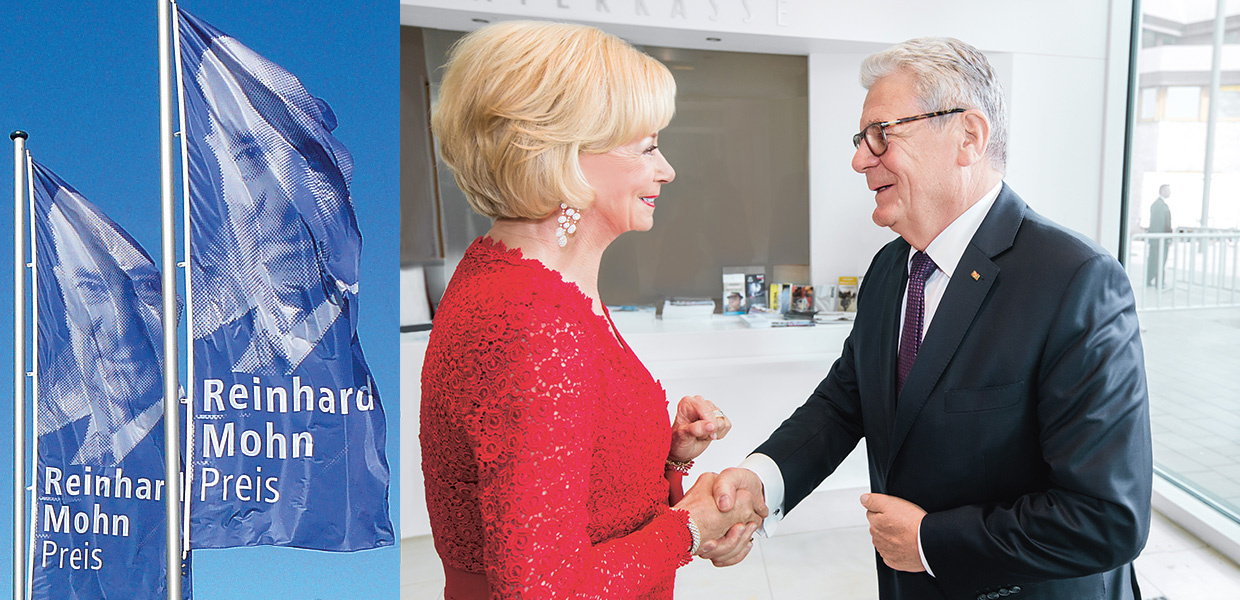"President Gauck never lost sight of the degree to which diversity is an enrichment for us," said Liz Mohn, vice-chairwoman of the Bertelsmann Stiftung Executive Board. "Again and again, he took a stand in favor of living together in diversity and engaging in a vigorous dialogue in a liberal and diverse country. Moreover, he always did so with courage, foresight and a fine sense of people's needs. That makes you an outstanding personality," Mohn said, addressing Gauck directly.
Gauck's tireless engagement for a free, cosmopolitan and tolerant society has left its mark on Germany. He always promoted understanding among cultures and religions and – in view of the history of two German dictatorships – defended the values of an open society. "Before many others did so, Joachim Gauck recognized that we must become familiar with disparate cultures. Only if we all know more about each other, if we are willing to engage with one another, can we coexist in peace. Only then can something new, something shared arise," Mohn emphasized in her remarks.
What is one's own and what is not
"In an immigration country like Germany, a sense of community cannot arise if the native and immigrant populations do not pull together to address core issues. They need essentials that are not open to debate, and they need variable rules that must be adhered to, so that this democracy, which ensures all of its citizens the same rights, is maintained and protected. In this country, the native population does not stand opposed to immigrants, in this country democratically inclined citizens stand opposed to citizens who reject plurality or who even sow hatred and are willing to become violent – be they among the native population or the immigrants," Gauck said in his acceptance speech.
As early as his inaugural speech to the German Bundestag on March 23, 2012, Gauck outlined Germany's new state of affairs: The sense of belonging in the country, he said, no longer derives only from a common history, but increasingly grows from the forward-looking "striving by a diverse society towards what is shared by all."
He also took a clear stance in light of the increasingly heated debate about immigration and refugees. One particularly memorable moment is the 65th anniversary of Germany's Basic Law, which was commemorated on May 22, 2014. On this highly symbolic occasion, as Germany's president he invited immigrants from 13 countries to Bellevue Palace to celebrate their becoming German citizens. In the speech he gave that day, he emphasized that "there is a new German 'we' which unifies those who are different. We do not lose ourselves when we accept diversity. We want this diverse 'we.'"
The former president is well aware of the challenges and problems stemming from living together in diversity: The risk of conflict is inherent to diversity, and concerted effort is required to maintain cohesion. Even after leaving office, Gauck has continued to address the topic of diversity. Among other activities, he is now the 2018 Heinrich Heine Guest Professor at the University of Düsseldorf, addressing the topic "Reflecting on what is one's own and what is not."
The presentation speech for Joachim Gauck was given by Elhadj As Sy, secretary general of the International Federation of Red Cross and Red Crescent Societies (IFRC), before an audience of some 500 guests at Gütersloh Theater. "There is only one humanity common to all of us: a diverse, a 'rainbow' humanity," he said. "People share norms and values across borders, but weaknesses and vulnerabilities also do not stop at borders. Principled, humane engagement is one way that leads us out of fear, stigmatization and exclusion to care, support and inclusion. It means supporting people in rebuilding what they consider most valuable: rebuilding their dignity. Such engagement means being part of the solution – even if it is simpler to be part of the problem. History and culture, religion and language are our compass for promoting our diverse humanity through empathy, respect and tolerance. This requires humility, courage and determined leadership – virtues to which Reinhard Mohn was committed and which are also embodied by Joachim Gauck."
Additional information
About the Reinhard Mohn Prize:
The Reinhard Mohn Prize is given in memory of the Bertelsmann Stiftung's founder, Reinhard Mohn (1921–2009). It is awarded to an internationally renowned individual who has played a key role in developing forward-looking solutions to social and political challenges. Five studies were carried out on the topic of diversity for the 2018 Reinhard Mohn Prize. At the same time, the Bertelsmann Stiftung also engaged in various ways with political and civil society initiatives, including conducting international research in Mechelen, Belgium, among other locations. A round table with researchers, experts and civil society representatives was also held in Berlin in May. This year the Reinhard Mohn Prize is dedicated to the topic "Living Diversity – Shaping Society."
About Joachim Gauck
Joachim Gauck cofounded the Rostock chapter of the New Forum movement in 1989 and represented the Alliance 90 party in East Germany's first freely elected parliament in 1990. From 1991 to 2000, the Protestant theologian was the Federal Commissioner for the Records of the State Security Service of the former German Democratic Republic. He was a member of the Supervisory Board of the European Monitoring Centre for Racism and Xenophobia from 2001 to 2004. From 2003 to 2012, he served as the chairman of the association "Gegen Vergessen – Für Demokratie" and has been its honorary chairman since 2017. From 2012 to 2017, he was the 11th president of the Federal Republic of Germany.
